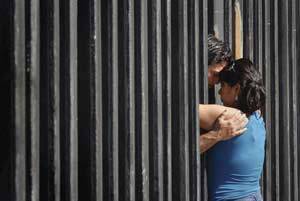As reports of increasing violence at the U.S.-Mexico border fill newspaper headlines, bishops of the United States, Canada, Central America and the Caribbean have called on their governments to address the economic root causes of hemispheric migration and urged policies that would create jobs for people in their homelands. During a regional consultation on migration held at the U.S. Conference of Catholic Bishops’ headquarters in Washington, D.C., on June 2-4, Bishop John C. Wester of Salt Lake City and bishops from Canada, Haiti and Latin America spoke about some of the primary issues related to immigration.
Addressing economic root causes of migration “in our mind, is the lasting and humane solution to the challenge of illegal immigration,” said Bishop Wester, chairman of the U.S.C.C.B. Committee on Migration, in a statement he read at a news conference on June 3. “Second, we believe that all governments, not only the United States, should look at their immigration laws and reform them in a manner which respects basic human rights.” The nations of the hemisphere also must “redouble their efforts against the scourge of human trafficking,” he said.
He noted that in a globalized world, where capital, communications and goods are readily exchanged, the movement of labor has not been regularized, and the impact of globalization on human beings has not been acknowledged or addressed. “As the most powerful country in our hemisphere and a destination for migrants, the United States should lead the way in this effort by reforming immigration laws as soon as possible,” said Bishop Wester.
Bishop álvaro Ramazzini Imeri of Guatemala said that the poor of his country have not benefited from the Central American Free Trade Agreement, known as Cafta, which Guatemala ratified three years ago. “The level of poverty in Guatemala is increasing,” he said. Bishop Ramazzini said his country is reeling from the twin effects of a volcanic eruption near the capital, Guatemala City, and the inundation of much of the country with up to three feet of rain by the tropical storm Agatha. The two disasters have destroyed many farmers’ entire production for the season, he said. That jeopardizes their income as well as the source of affordable food for Guatemalans, he said.
Bishop Francois Lapierre of Saint-Hyacinthe in Que-bec, Canada, said, “We are living an incredible contradiction. We want to live in a global economy, but every day we make it more difficult to go across the border.” In Europe people cross borders more easily all the time, he said, but passports are now required for Canadians and U.S. citizens to visit each other’s countries. Mexicans now need visas to visit Canada. Meanwhile, the church continues to address migration-related issues from a Gospel perspective, Bishop Lapierre said, “because somebody years ago said, ‘I was a stranger and you welcomed me.’”
Bishop Rafael Romo Múñoz of Tijuana, Mexico, chairman of the Mexican bishops’ migration commission, said his country is becoming a collection of semi-abandoned small towns as working-age teens and men go to the United States to provide for women, children and elderly people left behind. During the meeting, participants heard from directors of programs for Hispanic ministry, church public policy and social services to migrants. A panel of U.S. federal officials, including representatives of the White House and the Border Patrol, also met with the group.








